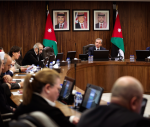You are here
The battle for gender equality will be won
Apr 11,2019 - Last updated at Apr 11,2019
Despite valiant efforts by the women’s rights movement to raise the age limit of marriage in Jordan, for exceptional cases, from 15 to 16, the joint session of Parliament this week refused to budge on the issue. Part of the reasoning behind the MPs’ decision was the recommendation by the top Sharia judge that, in exceptional cases, marriage of girls be allowed as young as 15.
The two Houses of Parliament had split on the issue, with the Lower House choosing the age of 15, while the Upper House, the Senate, choosing to close the loophole and keeping the minimum age of marriages at 18. The amendment to raise the exception to girl marriage to 16 failed in the joint session.
The parliamentary discussion about child marriage was overtaken by accusation of external interference in Jordanian affairs, in part as a result of Human Rights Watch’s (HRW) report issued on April 3 that called on Jordan to “end child marriage in status talks and to broaden negotiations to include equality for women”.
While women activists have generally welcomed HRW reports, this particular report and its timing caught Jordanian women activists off guard and produced a strong backlash behind the scenes. The feeling among women activists was that the report shifted attention from what appeared to be a winning case of lifting the minimum age to 16. It is not clear whether the absence of the report would have produced a different result.
The issue of equality between men and women continues to dominate social activism in the Arab world, especially after Tunisia’s decision to forgo religious sensitivity and allow for equality in terms of inheritance between males and females.
Ironically, Jordanian Christians have been working behind the scenes to amend Church regulations, which, until now, have adopted the regulation that favours males in cases of inheritance. A 2014 amendment to Jordan’s legislation has allowed courts of the 13 recognised Churches in Jordan to deal with issues of personal status independently, but the Churches have been slow in reforming their policies on issues of inheritance, divorce and custody.
Although the discussion on personal status laws has taken on a religious perspective, experts insist that there is no clarity in Islamic jurisprudence on the issue of marriage age. Noor Imam, a lawyer and human rights activist, spoke on Roya TV saying that there is no Quranic verse, or statements by Prophet Mohammad that give clear guidance on this issue: “The very fact that the general law forbids marriage before 18 shows that there is no violation of Islamic sharia here.” Imam complained that by allowing the loophole of the exception, the law has given judges the freedom to allow many cases of child marriage. Imam said that in 2018, the exception reached nearly 15 per cent of the total number of registered marriages. “This is no longer an exception,” she argued.
The Parliament also kept as law a legislation that prevented children of a daughter who died before, or at the same time of her father, from being included in the “mandated will”. This is another case of discrimination against women that many believe is in violation of the Constitution’s sixth article, which clearly states that all Jordanians are equal. Gender-based discrimination is not limited to marriage and inheritance, but it is also practiced in citizenship regulations, which prevent Jordanian women married to non-Jordanians from passing their citizenship to their children.
While many of these issues of discrimination against girls and women could be cleared up by the Constitutional Court, current regulations only allow Parliament, the government and courts to appeal to this most senior court. Women and civil society activists continue to work and lobby for serious changes to laws and regulations affecting girls and women. The current battle reminds many of the earlier losses in the fight to amend Article 308 of the Penal Code, which granted rapists immunity from punishment if they marry their victims. The fight to abolish Article 308 went through similar setbacks, only to be overturned in the end. The battle will continue and the rights of all Jordanians, irrespective of their gender, will be won.













